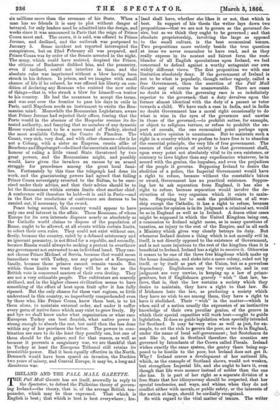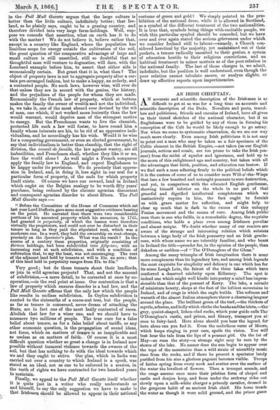IRELAND AND THE PALL MALL GAZETTE.
THEPall Mall Gazette has set itself, avowedly in reply to the Spectator, to defend the Philistine theory of govern- ing Ireland—the theory, that is, of the average British ten- pounder, which may be thus expressed. That which is English is best ; that which is best is best everywhere ; Ire-
land shall have, whether she likes it or not, that which is best. In support of his thesis the writer lays down two propositions—that we are not to govern as the governed de-
sire, but as we think they ought to be governed ; and that absolute proprietorship, involving the large as opposed
to the small culture, is the best economical tenure.
Two propositions more entirely beside the true question at issue we never remember to have read, and as they really express in its neatest and fairest form the root- blunder of all English speculations upon Ireland, we feel concerned to defend against a worthy antagonist our own widely different views. The first proposition we with one limitation absolutely deny. If the government of Ireland is not to be what is popularly, though rather vaguely, called a
free Government, then the assertion of the Pall Mall Gazette may of course be unanswerable. There are cases no doubt in which the governing race is so indefinitely superior to the governedy that a duty devolves upon the former almost identical with the duty of a parent or tutor towards a child. We have such a case in India, and in India no doubt Government has a moral right occasionally to do what is wise in the eyes of the governors and unwise in those of the governed,—to prohibit suttee, for example, or object to religious torture, or refuse to prohibit the ex- port of cereals, the one economical point perhaps upon which native opinion is unanimous. But to maintain such a right in a country which we profess to leave free is to abandon the essential principle, the very life of free government. The essence of that system of society is that government shall, upon every point not absolutely vital to its own existence, or contrary to laws higher than any expediencies whatever, be in accord with the genius, the impulses, and even the prejudices of the people it governs. Supposing Ireland to desire the abolition of a police, the Imperial Government would have a right to refuse, because without the constable's baton or sword, Government has no practical existence. Suppos- ing her to ask separation from England, it has also a right to refuse, because separation would involve the de- struction of the very organism which it exists to main- tain. Supposing her to seek the prohibition of all wor- ship except the Catholic, it has a right to refuse, because persecution for opinion is kits judgment a criminal act, would be so in England as well as in Ireland. A dozen other cases might be supposed in which the United Kingdom being one, a concession to Ireland might mean, as in many questions of taxation, an injury to the rest of the Empire, and in all such a Ministry which gives way clearly betrays its duty. But whenever Ireland desires a thing which is not morally evil in itself, is not directly opposed to the existence of Government, and is not more injurious to the rest of the kingdom than it is beneficial to Ireland, Ireland has a right to receive it. Otherwise it ceases to be one of the three free kingdoms which make up the home dominion, and sinks into a mere colony, ruled not by itself, or by itself as part of the Union, but as a powerless dependency. Englishmen may be very unwise, and in our. judgment are very unwise, in keeping up a law of primo- geniture, but if Englishmen gravely " wish " that law, be- lieve, that is, that the law sustains a society which they desire to maintain, they have a right to that law. So if Irishmen hate the law, as producing a society which they have no wish to see among them, they have a right to have it abolished. Their "wish" in the matter—which is when said of a nation usually the expression of an instinctive knowledge of their own peculiar genius, of the groove in which their special capacities will work best—ought to guide legislation. It does so guide legislation when specially intended for Scotland. It may beovery wise as well as just, for ex- ample, to set the rich to govern the poor, as we do in England, under the name of local self-government ; but Scotchmen do not like it, and in Scotland therefore the counties are governed by Intendants of the Crown called Fiscals. Ireland- wishes exactly the same system, the gentry there being sup- posed to be hostile to the poor, but Ireland does not get it. Why? Ireland craves a development of her national life, which, as the example of Scotland shows, would not weaken, but strengthen Imperial life, and she ought to have it, even though that life were meaner instead of nobler than the one she has. It is part of her right as a separate division of a free State that her idiosyncrasy should be respected, that her special tendencies, and ways, and whims, when they do not conflict either with morals, or public safety, or the interests of the nation at large, should be cordially recognized.
So with regard to the vital matter of tenure. The writer
in the - Pall Mail Gaiette argues that the large culture is better than the little culture, indefinitely 'better; that Ire-
land, as he plainly says, ought to be a grazing country, and therefore divided into very large farm-holdings. Well, sup- pose we concede that assertion, what on earth has it to do with the matter? We do not believe it, believe rather that, except in a country like England, where the population has limitless scope for energy Outside the cultivation of the soil,
the great question of the comparative advantage of large and small culture is still unsettled, still so doubtful that no thoughtful man will venture to dogmatize; will dare, with the Lombard example before him, to assert that either side is economically certain. But grant that it is, what then The object of property laws is not to aggregate property after a cer- tain pre-arranged fashion; but to make a happy, an orderly, and a contented people. No such laws, however wise, will ever do that unless they are in accord with the genius, the history, and the prejudices of the people for whom they are made. Economically the French law of property, which at bottom makes the family the owner of wealtitrand not the individual, is, we take it, one of the most absurd ever devised by the wit of man, one which, if not worked more leniently than the law would warrant, would deprive men of the strongest motive , to energy. But the Frenchman wants to live the clannish, protected life such a law will foster, to have round him a family whose interests are his, to be rid of an oppressive indi- vidualism, and he accordingly has his wish. Would it be wise for a conquering government, or even an elected government, to say that individualism is better than clanship, that the right of division, the conceit de fandlk, the law against wastry, are all imbecilities, and Frenchmen shall, whether they like it or no, face the world alone ? As well might a French conqueror apply the family law to England, and expect Englishmen to be happy under its provisions. We do precisely that oppres- sion in Ireland, and, in doing it, lose sight in our zeal for a particular form of property, of the ends for which property itself exists. Of course we have our reward, land in Ireland which ought on the Belgian analogy to be worth fifty years' purchase, being reduced by the chronic agrarian discontent and consequent agrarian disorder to about fifteen. The Pall Mall Gazette says :— !‘ Before the Committee of the House of Commons which sat last year Lord Dufferin gave some moat suggestive evidence bearing on the point. He narrated that rthere were two considerable portions of his ancestral property which his ancestors, in 1745, had granted in perpetuity, of which the lessees were therefore virtually the proprietors, and could not ever be disturbed in their tenure so long as they paid the stipulated rent, which was a moderate one. In a word, they held the ownership on rent-charge, precisely on the Spectator's plan. What was the result? In the course of a century these properties, originally consisting of thirteen holdings, had been subdivided into fifty-two, with an increasing rent at each subdivision, and with a condition of cultivation that, to say the least, was not encouraging. The rent of the adjacent land held by tenants at will is 25s. an acre ; that of this land held in perpetuity ranges from 27s. to 35s."
Very good ; but do those tenants shoot their landlords, or join in wild agrarian projects? That, and not the amount of subdivision,—a mere detail, to be corrected at once by co- operation,—is the real point at issue. Our contention is that a law of property which ensures disorder is a bad law, and the Pall Mall Gazette affirms that the only law which the people like results in endless subdivision. In Ceylon subdivision is carried to the sixteenths of a cocoa-nut tree, but the people, as far as tenure is concerned, never dream of attacking the State, are in fact one of the most lazily contented of races. Abolish that law for a wiser one, and we should have to massacre two millions of people. The true cure for a false belief about tenure, as for a false belief about tariffs, or any other economic question, is the propagation of sound ideas, not force, which on matters of tenure is as inapplicable and as useless as on matters of faith. Of course it is a most difficult question whether so great a change is in Ireland now possible without immoral violence towards the owners of the soil, but that has nothing to do with the ideal towards which we and they ought to strive. Our plan, which in India was carried out over a country to which Ireland is a speck, was stated as an ideal, not as one to be enforced in a session, in the teeth of rights we have contracted for two hundred years to maintain.
Finally, we appeal to the Pall Mall Gazette itself whether it is quite just in a writer who really understands us and himself, to say the only suggestion we have to make is that Iriahmen should be allowed to appear in their national
costume of green and gold? We simply pointed to the pros hibition of the national dress, while it is allowed in Scotland, as a symbol of the different treatment of the two nationalities. It is true that, symbols being things with excitable people, we wish this particular symbol should be conceded, but we have over and over again stated the serious grievances under which we consider Ireland still to labour—namely, a Church con- sidered heretical by the majority, yet maintained out of their pockets, a tenure radically unsuited to their genius, a system of education hostile to their religions convictions, and an. habitual treatment in minor matters as of the poor relation in the national family. The last of those charges is, we admit, indefinite, but the position is well understood, even though the poor relation cannot tabulate sneers, or analyze slights, or draw up effective reports upon imperbinencies.































 Previous page
Previous page